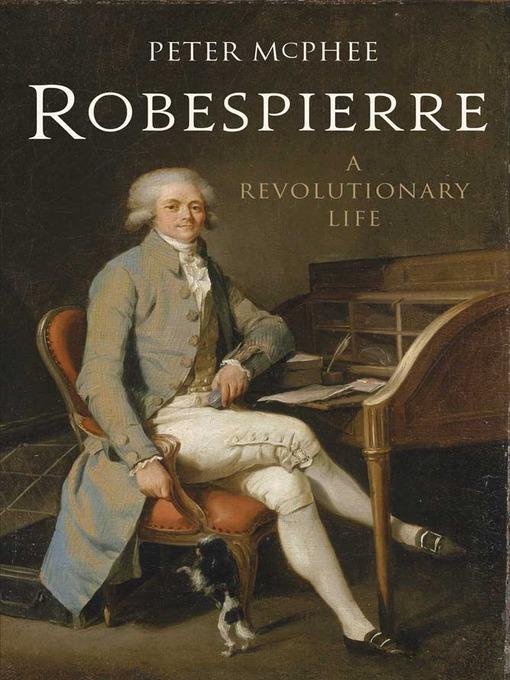
Robespierre
A Revolutionary Life
کتاب های مرتبط
- اطلاعات
- نقد و بررسی
- دیدگاه کاربران
نقد و بررسی

March 26, 2012
Historian and professor McPhee (Living the French Revolution, 1789-1799) adds to his volumes on French history with a comprehensive biography of the controversial, diminutive, outspoken, and ambitious man who overcame adversity to become a lawyer, who argued for the rights of children born out of wedlock and freedom of the press in 18th-century France, and whose name is inextricably linked with the French Revolutionâfor better or worse. McPhee maintains that Maximilien Robespierre "was seeking to make sense of the chaos of a world in revolutionary upheaval and to use his talents to create stability and certainty for a new order"âbut at the end of his short life, he was "reviled as thoroughly as he had once been idolized." McPhee succeeds in his goal of illuminating Robespierre's early life and career (as well as his ideological and political development), and continues with thorough detail to his execution in 1794; his view is sympathetic to Robespierre, downplaying his fanaticism and dictatorial tendencies that other biographers describe. McPhee includes a detailed chronology of Robespierre's life, as well as extensive endnotes and a bibliography, which documentation will allow readers to determine whether they agree with McPhee's assertion that, "Far from the emotionally stunted, rigidly puritanical and icily cruel monster of history and literature, this was a passionate man." This fast-moving and thorough exploration of Robespierre's life and death will interest devotees of French history, particularly those looking for a fresh take on the Revolution. Illus.

February 15, 2012
A meticulous but limited treatise on the life of one of France's most notorious revolutionaries. Maximilien Robespierre (1758-1794) was a young provincial lawyer who came to Paris as a representative of the Third Estate, and he remained to become a leader of the leftist Jacobins in the revolutionary National Convention. A spellbinding orator, he was immensely controversial, revered by many as "the Incorruptible" genius of the revolution, reviled by others as a would-be tyrant, and his popularity underwent wild swings. Robespierre began his career as an opponent of capital punishment but ended it obsessed with omnipresent treasonous conspiracies and meting out death without trial to perceived enemies of the state, declaring that "the mainspring of popular government...is at once virtue and terror." He has thus long been popularly execrated as the bloodthirsty architect of the "reign of terror" of 1793-94. McPhee (Living the French Revolution 1789-1799, 2006, etc.) strives to rehabilitate Robespierre somewhat, arguing that the sanguinary excesses of the period were necessary to sustain the revolution against attacks from without and within, and that Robespierre's role in them was later exaggerated by other deputies seeking to minimize their own culpability. Given Robespierre's savage rhetoric and his influence at the time, McPhee's attempts at exoneration are less than thoroughly persuasive. The author also gives more attention to Robespierre's formative years and pre-revolutionary activities than has been customary in previous biographies. This is a thorough and well-written account of Robespierre's life, but nothing more. It is not a history of the French Revolution, and readers without a general familiarity with the events of that upheaval will have difficulty placing Robespierre's activities in a larger context. Similarly, while Robespierre's every political shift and maneuver is set forth in careful detail, no other leaders or personalities stand out in this narrative; even giants like Georges Jacques Danton and Jean-Paul Marat have only walk-on roles. A solid contribution to the scholarship of this key figure of the French Revolution.
COPYRIGHT(2012) Kirkus Reviews, ALL RIGHTS RESERVED.

March 1, 2012
As head of the French Revolution's Committee of Public Safety, did Maximilien Robespierre (1758-94) save the republic with draconian measures or was he merely the first in a long line of modern dictators to justify rule by reference to a public will that only the leader could interpret? In this admirable biography, McPhee (professorial fellow, Univ. of Melbourne; Living the French Revolution, 1789-1799) dispassionately describes the steps by which Robespierre came to accept violence as a response to increasingly dire events. Robespierre's model for governing was always Rousseau's: government should promote virtue. His identification with the people sometimes seemed excessive--"I am the people myself"--but he tempered revolutionary ardor with pragmatism. Near the end, these instincts failed him. When he did not specify who might yet come to trial before revolutionary tribunals, he threatened too many people. The next day, he was arrested. The virtues of this biography are many: McPhee knows his sources, writes clearly, and, recognizing that his subject died in his 30s and left scant personal records, never attempts answers based on insufficient evidence. VERDICT Readers interested in the French Revolution will love this wise book about an important and enigmatic figure. Highly recommended.--David Keymer, Modesto, CA
Copyright 2012 Library Journal, LLC Used with permission.

























دیدگاه کاربران